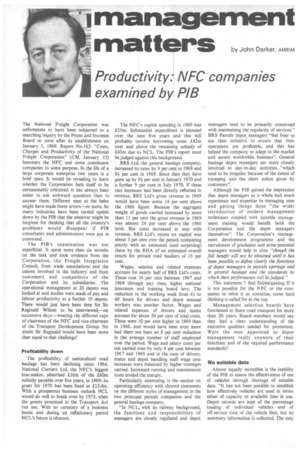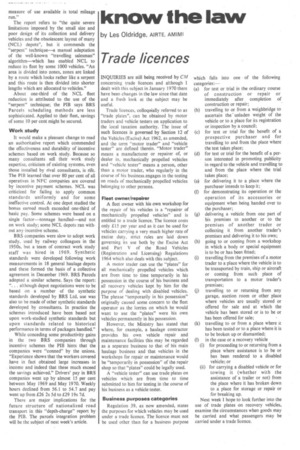management
Page 52

Page 53

If you've noticed an error in this article please click here to report it so we can fix it.
matters by John Darker, AMBIM
Productivity: NFC companies examined by PIB
The National Freight Corporation was unfortunate to have been subjected to a searching inquiry by the Prices and Incomes Board so soon after its establishment on January 1, 1969. Report No.162: "Costs, Charges and Productivity of the National Freight Corporation" (CM, January 15) hammers the NFC and some constituent companies to some purpose. In the life of a large corporate enterprise two years is a brief span. It would be revealing to learn whether the Corporation feels itself to be unreasonably criticized. It has always been easier to ask awkward questions than to answer them. Different men at the helm might have made fewer errors—or more. So many industries have been turned upside down by the PIB that the observer might be forgiven for thinking that all the country's problems would disappear if PIB consultants and administrators were put in command.
The PIB's examination was not superficial. It spent more than six months on the task and took evidence from the Corporation, the Freight Integration Council, from trade associations and the unions involved in the industry' and from customers and competitors of the Corporation and its subsidiaries. The operational management at 20 depots was looked at and studies were made of pay and labour productivity at a further 10 depots. There would just have been time for Sir Reginald Wilson to. be interviewed,—on successive days—wearing the different caps of chairman of the NFC and vice-chairman of the Transport Development Group. No doubt Sir Reginald would have been more than equal to that challenge!
Profitability down The profitability of nationalized road haulage has been declining since 1964. National Carriers Ltd, the NFC's biggest loss-maker, absorbed £16m of the £60m subsidy payable over five years, in 1969; its grant for 1970 has been fixed at £13.4m. With a prosperous business outlook NCL would do well to break even by 1973, when the grants promised in the Transport Act run out. With no certainty of a business boom and during an inflationary period NCL's future is obscure. The NFC's capital spending in 1969 was £25m. Substantial expenditure is planned over the next five years and this will probably involve borrowing some £42m over and above the remaining subsidy of £43m due to NCL. The PIB's report must be judged against this background.
• BRS Ltd, the general haulage company, increased its rates by 9 per cent in 1968 and 8+ per cent in 1969. Since then they have gone up by 9+ per cent in January 1970 and a further 9 per cent in July 1970. If these rate increases had been directly reflected in revenue, BRS Ltd's gross revenue in 1969 would have been some 14 per cent above the 1966 figure. Because the aggregate weight of goods carried increased by more than 11 per cent the gross revenue in 1969 was almost 24 per cent above the 1966 level. But costs increased in step with revenue. BRS Ltd's return on capital was about 3 per cent over the period, comparing poorly with an estimated (and surprising) claim by the RHA of an estimated overall return for private road hauliers of 15 per cent.
Wages, salaries and related expenses account for nearly half of BRS Ltd's costs. These rose 16 per cent between 1967 and 1969 through pay rises, higher national insurance and training board levy. The reduction in the 'working week from 41 to 40 hours for drivers and depot manual workers was another factor. Wages and related expenses of drivers and mates account for about 30 per cent of total costs. These were 10 per cent higher in 1969 than in 1966, and would have been even more had there not been an 8 per cent reduction in the average number of staff employed over the period. Wage and salary costs per ton carried rose by only 4 per cent between 1967 and 1969 and in the case of drivers, mates and depot handling staff wage cost increases were balanced by higher tonnages carried. Increased running and maintenance costs eroded the margin.
Particularly interesting is the section on operating efficiency with shrewd comments on the different styles of management in the two principal parcels companies and the general haulage company.
"In NCL, with its railway background, the functions and responsibilities of managers are closely regulated and depot managers tend to be primarily concerned with maintaining the regularity of services." BRS Parcels depot managers "feel freer to use their initiative to ensure that their operations are profitable, and this has helped the company to adapt to the market and secure worthwhile business". General haulage depot managers are more closely involved in day-to-day activities "which tend to be irregular because of the extent of tramping and the short notice given by customers".
Although the PIB gained the impression that depot managers as a whole had much experience and expertise in managing men and getting things done "the wider introduction of modern management techniques coupled with suitable management training would benefit both the Corporation. and the depot managers themselves". The Corporation's management development programme and the recruitment of graduates and some potential managers would help in time "though the full benefit will not be obtained until it has been possible to define clearly the functions of depot managers in parcels carriage and in general haulage and the standards by which their performance will be judged."
This statement I find flabbergasting If it is not possible for the NFC or the companies to rebut it as nonsense, some hard thinking is called for at the top.
Management selection boards have functioned in State road transport for more than 20 years. Board members would say they had a clear understanding of the executive qualities needed for promotion. Were the men appointed to depot management really unaware of their functions and of the required performance standards?
No suitable data Almost equally incredible is the inability of the PIB to assess the effectiveness of use of vehicles through shortage of suitable data. "It has not been possible to establish how effectively vehicles are used in terms either of capacity or available time in use. Depot records are kept of the percentage loading of individual vehicles and of off-service time of the vehicle fleet, but no summary information is collected. The only measure of use available is total mileage run."
The report refers to "the quite severe limitations imposed by the small size and poor design of its collection and delivery vehicles and the obsolescent layout of many (NCL) depots", but it commends the "serpent" technique—a manual adaptation of the well-known "travelling salesman" algorithm—which has enabled NCL to reduce its fleet by some 1000 vehicles. "An area is divided into zones, zones are linked by a route which looks rather like a serpent and this route is then divided into shorter lengths which are allocated to vehicles."
About one-third of the NCL fleet reduction is attributed to the use of the "serpent" technique; the PIB says BRS Parcels scheduling methods are less sophisticated. Applied to their fleet, savings of some 10 per cent might be secured.
Work study
It would make a pleasant change to read an authoritative report which commended the effectiveness and durability of incentive schemes based on work study. Because so many consultants sell their work study expertise, criticism of existing systems, even those installed by rival consultants, is rife. The PIB learned that over 80 per cent of all operatives in NFC companies are covered by incentive payment schemes. NCL was criticized for failing to apply common standards uniformly and for some ineffective control. At one depot studied the bonus earned much exceeded one-third of basic pay. Some schemes were based on a single factor—tonnage handled—and not on work study; some NCL depots ran without any incentive scheme.
BRS companies were slow to adopt work study, used by railway colleagues in the 1950s, but a team of contract work study staff was hired in 1969. Synthetic standards were developed following work measurements in 18 general haulage depots and these formed the basis of a collective agreement in December 1969. BRS Parcels adopted a similar scheme. Says the report: if. • although depot negotiations were to be based on a number of the synthetic standards developed by BRS Ltd, use was also to be made of other synthetic standards developed by consultants. In practice the schemes introduced have been based not upon work-studied synthetic standards but upon standards related to historical performance in terms of packages handled."
While conceding some productivity gains in the two BRS companies through incentive schemes the PIB hints that the companies were "conned" by the unions. "Experience shows that the workers covered have in fact obtained large increases in income and indeed that these much exceed the savings achieved." Drivers' pay in ERG companies went up by almost 15 per cent between May 1969 and May 1970. Weekly hours declined from 56.1 to 54.7 and pay went up from £26 2s 5d to £,29 19s '7d.
There are major implications for the future structure of nationalized road transport in this "depth-charge" report by the PIB. The parcels integration problem will be the subject of next week's article.




































































































